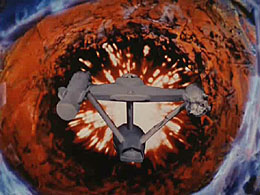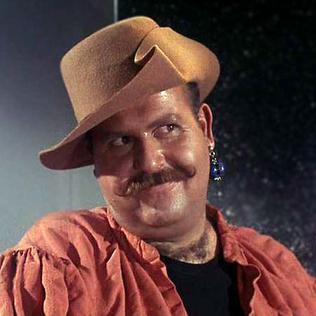Related Research Articles
"Mirror, Mirror" is the fourth episode of the second season of the American science fiction television series Star Trek. Written by Jerome Bixby and directed by Marc Daniels, it was first broadcast on October 6, 1967.

"Spock's Brain" is the third season premiere episode of the American science fiction television series Star Trek. Written by Gene L. Coon and directed by Marc Daniels, it was first broadcast on September 20, 1968.

"The Doomsday Machine" is the sixth episode of the second season of the American science fiction television series Star Trek. Written by Norman Spinrad and directed by Marc Daniels, it was first broadcast on October 20, 1967.
"Shore Leave" is the fifteenth episode of the first season of the American science fiction television series Star Trek. Written by Theodore Sturgeon and directed by Robert Sparr, it first aired on December 29, 1966.

"This Side of Paradise" is the twenty-fourth episode of the first season of the American science fiction television series Star Trek. Written by D. C. Fontana and Jerry Sohl and directed by Ralph Senensky, it was first broadcast on March 2, 1967.

The Menagerie is a two-part episode from the first season of the American science fiction television series Star Trek. It comprises the eleventh and twelfth broadcast episodes of the series. Written by series creator Gene Roddenberry, with portions directed by Marc Daniels and portions directed by Robert Butler, it is the only two-part story in the original series. Part I was broadcast by NBC on November 17, 1966, and Part II was broadcast on November 24, 1966. In the episode, Spock abducts his former commander Christopher Pike, locks the starship Enterprise on a course to the forbidden planet Talos IV and turns himself in for court-martial where he presents an elaborate story explaining his actions.
"The Squire of Gothos" is the 17th episode of the first season of the American science-fiction television series, Star Trek. Written by Paul Schneider, and directed by Don McDougall, it first aired on January 12, 1967.
"The Enemy Within" is the fifth episode of the first season of the American science fiction television series, Star Trek. Written by Richard Matheson and directed by Leo Penn, it first aired on October 6, 1966.

"Mudd's Women" is the sixth episode of the first season of the American science fiction television series Star Trek. Written by Stephen Kandel, based on a story by Gene Roddenberry, and directed by Harvey Hart, it first aired on October 13, 1966.

"Tomorrow Is Yesterday" is the nineteenth episode of the first season of the American science fiction television series Star Trek. Written by D. C. Fontana and directed by Michael O'Herlihy, it first aired on January 26, 1967. It was the first Star Trek episode to be written solely by a woman.
"Operation -- Annihilate!" is the twenty-ninth and final episode of the first season of the American science fiction television series Star Trek. Written by Steven W. Carabatsos and directed by Herschel Daugherty, it was first broadcast April 13, 1967.
"Who Mourns for Adonais?" is the second episode of the second season of the American science fiction television series Star Trek. Written by Gilbert Ralston and Gene L. Coon, and directed by Marc Daniels, it was first broadcast September 22, 1967.
"The Apple" is the fifth episode of the second season of the American science fiction television series Star Trek. Written by Max Ehrlich and directed by Joseph Pevney, it was first broadcast on October 13, 1967.
"The Immunity Syndrome" is the eighteenth episode of the second season of the American science fiction television series Star Trek. Written by Robert Sabaroff and directed by Joseph Pevney, it was first broadcast on January 19, 1968.
"Elaan of Troyius" is the thirteenth episode of the third season of the American science fiction television series Star Trek. Written and directed by John Meredyth Lucas, it was first broadcast on December 20, 1968.
"Day of the Dove" is the seventh episode of the third season of the American science fiction television series Star Trek. Written by Jerome Bixby and directed by Marvin Chomsky, it was first broadcast November 1, 1968.

"The Cloud Minders" is the twenty-first episode of the third season of the American science fiction television series Star Trek. Written by Margaret Armen and directed by Jud Taylor, it was first broadcast on February 28, 1969.
"Whom Gods Destroy" is the fourteenth episode of the third season of the American science fiction television series Star Trek. Written by Lee Erwin and directed by Herb Wallerstein, it was first broadcast on January 3, 1969.
"That Which Survives" is the seventeenth episode of the third season of the American science fiction television series Star Trek. Written by John Meredyth Lucas and directed by Herb Wallerstein, it was first broadcast January 24, 1969.
"The Alternative Factor" is the twenty-seventh episode of the first season of the American science fiction television series Star Trek. Written by Don Ingalls and directed by Gerd Oswald, it first aired on March 30, 1967.
References
- ↑ Blish, James (April 1975). Star Trek 11. Bantam Books. p. 82. ISBN 0553135023 . Retrieved April 23, 2023.
- ↑ Ward, Dayton (December 16, 2010). "Star Trek Re-watch: "Wink of an Eye"". Tor.com. Retrieved September 3, 2012.
- ↑ Mack, David Alan (December 16, 2010). "Star Trek Re-watch: "Wink of an Eye"". Tor.com. Retrieved September 3, 2012.
- ↑ Handlen, Zack (January 22, 2010). ""Wink Of An Eye"/"The Empath"". The A.V. Club . Retrieved September 3, 2012.
- ↑ Hayes-Gehrke, Melissa N. (November 22, 2008). "Episode Review of Star Trek - The Original Series Season 3: "Wink of an Eye"". University of Maryland: Department of Astronomy. Retrieved September 3, 2012.
- ↑ "Wink of an Eye". StarTrekReviews.com. Retrieved September 3, 2012.
- 1 2 3 "LaserDisc Database - Star Trek: Original Series log.3 [PILF-1711]". www.lddb.com. Retrieved February 23, 2021.
- ↑ "Star Trek: The Remastered Series Seasons 1, 2 & 3 review". Den of Geek. May 20, 2009. Retrieved February 23, 2021.